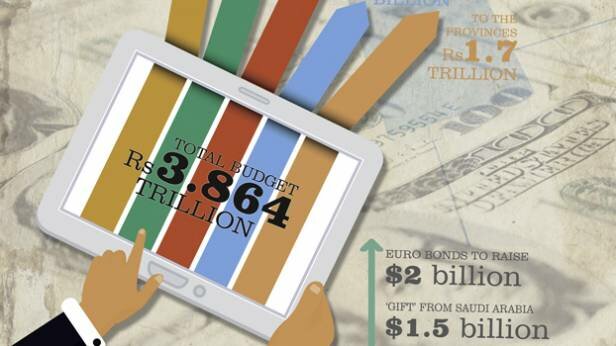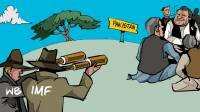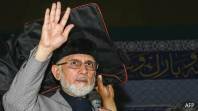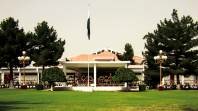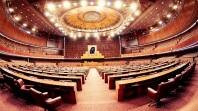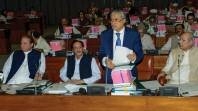The exercise for making next year’s federal budget is completed after economic managers have drafted a budget outlay that meets the core condition of the $6.7 billion International Monetary Fund programme. In line with the IMF’s directions, the incumbent government will unveil its second budget on June 3 that envisages a Rs1.4 trillion fiscal deficit, which is roughly 4.8% of the GDP.
The targets that the government sets at the beginning of the fiscal year are rarely met. Except for the increase in salaries and pensions of government servants, there is nothing interesting for the average person in most budgets. The fiscal measures the successive governments, including the PML-N, have taken are only meant to achieve budget deficit targets, or improve visible macro-level indicators, without actually caring about the people that constitute the economy.
The review of the governments present fiscal year, ending later this month, presents a bleak picture. Several short-term stabilization measures were put in place largely focused on improving investment perceptions, exchange rate stabilization, auctions of next generation spectrums and the floatation of Euro bonds to raise about $2 billion.
None of these measures can be considered lasting reforms. Other administrative decisions like increasing power tariffs, or milking the people already caught in the tax net, were also shortsighted. The plan was just to make it to 2014.
This is in total contrast to Finance Minister Ishaq Dar’s promise that his government would, “build an economy that is not dependent on others except through trade and investment, based on competitive advantage and market considerations”.
But the stop-gap solution of reliance on foreign powers continues unabated. First world aid continues to flow in, and earlier this year the government proudly received a $1.5 billion ‘gift’ from Saudi Arabia, to stimulate further spending.
Last year’s target to increase the investment-to-GDP ratio to 15.1% has been missed. The economic growth target of 4.4% has been missed.
On the international trade front, the government could not normalize trade ties with India despite agreeing on a March 31 deadline, and also agreeing in spirit to an FTA. On the back of the spadework done by the PPP government, the country finally received duty free access to the European Union. But the PML-N government could not win trade concessions from the United States.
The government had also promised to reduce its foot prints and make the private sector the lynchpin of economic activities. But reforms to bring the private sector at the driving seat have not yet been initiated. No efforts are made to lessen bureaucratic red tape. The private sector remains reluctant to take the plunge.
It had also boldly stated a year ago that all segments of the population must share the burden of resource mobilization for running the government. The culture of exemptions and concessions has to end to build a self-reliant economy.
This is where the government has failed the most. Nothing has been done to make taxation more equitable. Instead, the hands of the industrialists and traders have been strengthened further during last one year. It has given a further 26 exemptions to businesses while not a single tax exemption has been withdrawn.
The only positive this past year comes from Ishaq Dar’s promise to protect the poorest segments of the population. His government has kept intact the Benazir Income Support Programme and also increased the monthly stipend by 20%. It has also protected the lowest income groups from the increase in electricity prices and is bearing a hefty subsidy cost.
But it is still with large amounts of failure on his back that Ishaq Dar will unveil his government’s second budget.
The proposed size of the budget so far is Rs3.864 trillion, which is roughly 8 per cent or Rs268 billion higher than the previous one. A sum of Rs1.347 trillion has been proposed for external debt servicing, which is a third of the total budget, making it the single largest head, as is the case every year. The government’s internal circular debt is not a part of this number.
The proposed defence budget stands at around Rs700 billion — an increase of 11 per cent, or Rs73 billion, over this year. Power sector subsidies are estimated at Rs229 billion in 2014-15.
Under the National Finance Commission (NFC) Award, the provinces are going to receive a total of Rs1.7 trillion. Rs215 billion are going to be allocated for paying pensions to retired employees, and Rs285 billion will be set aside for federal government service delivery.
The allocation for the Public Sector Development Programme (PSDP) has been proposed at Rs525 billion. While the total tax revenues expected by the Nawaz government for the next budget are estimated at Rs3.937 trillion.
Out of the total tax revenues, the FBR’s tax collection target has been proposed at Rs2.810 trillion for the next budget against the revised estimates of Rs2.275 trillion in the current fiscal year. However, the non-tax revenues for the next budget have been lowered down and fixed at Rs817 billion against the revised estimates of Rs859 billion for the outgoing fiscal year 2013-14.
After transferring the sum of Rs1.7 trillion to the provinces, the net revenues left for the centre will be standing in the range of Rs2.234 trillion.
The snapshot of the proposed budget indicates the same thing as last year: the government is planning short term. It is not going to take any drastic steps to introduce reforms in energy and taxation. It will rely again on tricks of the trade to increase its revenues, possible mainly because the PML-N controls both the centre and the biggest provincial economy.
The writer is a journalist based in Islamabad.
Box
The country’s leading tax expert Ashfaq Tola, Senior Partner at Naveed Zafar Ashfaq Jaffery and Company, says Pakistan’s taxation system is one of the most complex systems in the world. This system, consequent to the 18th amendment, has become even more complicated and efficient revenue collection is proving an impossible task, severely impeding the state’s economic activities.
Tola argues that the corporate tax system violates the basic taxation principles of equity, fairness, compliance and the reduction of administration costs. He says more than half of corporate taxes are collected through presumptive or fixed taxes, which must be reformed.
He says same is the case of sales tax. With devolution of power due to 18th amendment and through formation of provincial sales tax authorities, an intertwined system of sales tax has compounded the miseries of the taxpayers. Tola says that shifts in consumer spending, technological advances and an abundance of tax exemptions, have all retarded the growth of sales tax revenue relative to the economy itself.
He suggests that tax laws have to be simplified to the advantage of taxpayers and that tax compliance can be enhanced by reducing filing frequency of tax returns for small businesses. The timing of certain filings could also be synchronized to facilitate compliance.
Box
A recent report from the Institute for Policy Reforms, written by the country’s renowned economist and former Finance Minister Dr. Hafiz Pasha has highlighted the expectations for the new budget. Dr Pasha writes that the federal budget of 2014-15 will be framed in the backdrop of heightened expectations that it will represent a transition from stabilization to revival.
He states that the expectations are based on the sizeable increase in foreign exchange reserves which have reduced the vulnerability of the balance of payments, following the gift of $1.5 billion from a friendly country and a successful floatation of the Euro bond of $2 billion.
He argues that people are legitimately expecting some relief, after a year of high inflation, especially in food prices, in line with the election promises of the ruling PML-N. But he says that to the disappointment of those who are expecting relief, the IMF will continue to place emphasis on fiscal consolidation till such time as the combined budget deficit of the federal and provincial governments fall to about 4% of the GDP. It will currently stand at 4.8%. For Dr. Pasha the government will have to maintain an intricate balance between the pressures to go for an expansionary fiscal policy, spending more on service delivery, on the one hand and achieving deficit reduction on the other.

